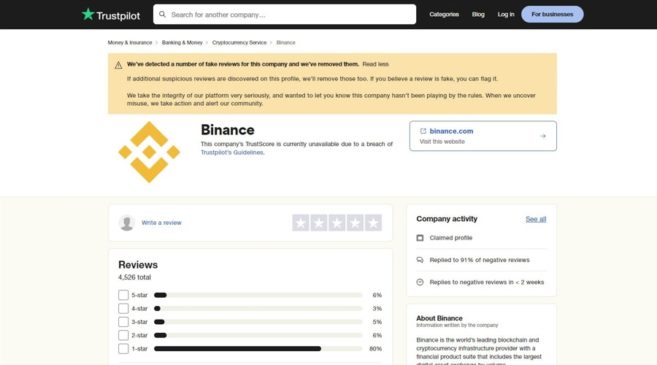Trustpilot, a platform where real users provide reviews, has disabled the ‘TrustScore’ of crypto exchange Binance, alleging the detection of “a number of fake reviews for this company.” The review platform has already removed the fake reviews.
“If additional suspicious reviews are discovered on this profile, we’ll remove those too. If you believe a review is fake, you can flag it,” a banner on the verified page of Binance on Trustpilot stated.
“We take the integrity of our platform very seriously and wanted to let you know this company hasn’t been playing by the rules. When we uncover misuse, we take action and alert our community.”
When it comes to reviews of any digital platform, especially those in financial services, Trustpilot is considered trustworthy. Although satisfied users write positive reviews of platforms on Trustpilot, it has also attracted stressed traders and investors posting their grievances. Any negative reviews on Trustpilot can heavily impact the reputation of platforms, as many prominently advertise their Trustpilot score to enhance their brand value.
Richard Teng, CEO of Binance
However, many have figured out how to post fake reviews on Trustpilot. Many freelancers on some online platforms even advertise their services to post fake Trustpilot reviews. Recently, the US’ Federal Trade Commission even officially banned fake reviews of platforms.
“We Have Zero Tolerance for Fake Reviews”
Trustpilot’s action against Binance was due to a breach of its guidelines, which state: “Don’t write or ask people to write fake reviews. We have zero tolerance for fake reviews and will remove them.”
Although Trustpilot is not showing Binance’s ‘TrustScore’, users can still post reviews of the crypto exchange. Interestingly, out of 4,526 reviews on Binance, 80 percent have 1 star, and 6 percent have 2 stars. Trustpilot counts “1 and 2-star reviews as negative.”
The review website also highlighted that Binance replied to 91 percent of the negative reviews.
Interestingly, the TrustScores of most prominent crypto exchanges vary between ‘Bad’ and ‘Poor’. Coinbase, one of the most reputed exchanges, has a TrustScore of 2.4, which is ‘Poor’, similar to OKX, which has a TrustScore of 1.8. Bybit, with a TrustScore of 1.5, is rated as ‘Bad’.
A screenshot of Coinbase’s official Trustpilot page
According to an archived version of Binance’s Trustpilot page, the crypto exchange had a TrustScore of 2 in May last year, which was deemed ‘Bad’.
Finance Magnates approached to Binance, but has not received any response as of press time.
In June, Trustpilot “temporarily suspended” the profile of Funding Pips, a prop trading platform, after “an increase in reviews related to recent media attention.” However, the prop firm’s page has since been restored, and it currently has a TrustScore of 4.4, which is deemed ‘Excellent’, based on 13,610 reviews.
Trustpilot, a platform where real users provide reviews, has disabled the ‘TrustScore’ of crypto exchange Binance, alleging the detection of “a number of fake reviews for this company.” The review platform has already removed the fake reviews.
“If additional suspicious reviews are discovered on this profile, we’ll remove those too. If you believe a review is fake, you can flag it,” a banner on the verified page of Binance on Trustpilot stated.
“We take the integrity of our platform very seriously and wanted to let you know this company hasn’t been playing by the rules. When we uncover misuse, we take action and alert our community.”
When it comes to reviews of any digital platform, especially those in financial services, Trustpilot is considered trustworthy. Although satisfied users write positive reviews of platforms on Trustpilot, it has also attracted stressed traders and investors posting their grievances. Any negative reviews on Trustpilot can heavily impact the reputation of platforms, as many prominently advertise their Trustpilot score to enhance their brand value.
Richard Teng, CEO of Binance
However, many have figured out how to post fake reviews on Trustpilot. Many freelancers on some online platforms even advertise their services to post fake Trustpilot reviews. Recently, the US’ Federal Trade Commission even officially banned fake reviews of platforms.
“We Have Zero Tolerance for Fake Reviews”
Trustpilot’s action against Binance was due to a breach of its guidelines, which state: “Don’t write or ask people to write fake reviews. We have zero tolerance for fake reviews and will remove them.”
Although Trustpilot is not showing Binance’s ‘TrustScore’, users can still post reviews of the crypto exchange. Interestingly, out of 4,526 reviews on Binance, 80 percent have 1 star, and 6 percent have 2 stars. Trustpilot counts “1 and 2-star reviews as negative.”
The review website also highlighted that Binance replied to 91 percent of the negative reviews.
Interestingly, the TrustScores of most prominent crypto exchanges vary between ‘Bad’ and ‘Poor’. Coinbase, one of the most reputed exchanges, has a TrustScore of 2.4, which is ‘Poor’, similar to OKX, which has a TrustScore of 1.8. Bybit, with a TrustScore of 1.5, is rated as ‘Bad’.
A screenshot of Coinbase’s official Trustpilot page
According to an archived version of Binance’s Trustpilot page, the crypto exchange had a TrustScore of 2 in May last year, which was deemed ‘Bad’.
Finance Magnates approached to Binance, but has not received any response as of press time.
In June, Trustpilot “temporarily suspended” the profile of Funding Pips, a prop trading platform, after “an increase in reviews related to recent media attention.” However, the prop firm’s page has since been restored, and it currently has a TrustScore of 4.4, which is deemed ‘Excellent’, based on 13,610 reviews.



